|
|
|
Sort Order |
|
|
|
Items / Page
|
|
|
|
|
|
|
| Srl | Item |
| 1 |
ID:
120357
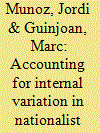

|
|
|
|
|
| Publication |
2013.
|
| Summary/Abstract |
Between September 2009 and April 2011, around one-half of the Catalan municipalities held unofficial referendums on independence from Spain, in which more than 800,000 citizens took part. However, the participation rates were unevenly distributed across Catalonia. In this paper, using an original data set, we aim to respond to two relevant questions: first, why in some municipalities the referendum took place and in others it did not occur. Second, why did the referendum achieve high rates of turnout in some localities and much lower participation in others. We find that the resources available to the movement, the intensity of the mobilization efforts, the participatory tradition of the municipalities and the size of the nationalist 'sentiment pool' in each locality explain to a great extent the internal variation in nationalist mobilization in Catalonia.
|
|
|
|
|
|
|
|
|
|
|
|
|
|
|
|
| 2 |
ID:
180644
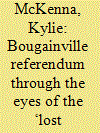

|
|
|
|
|
| Summary/Abstract |
A referendum to decide on Bougainville's future political relationship with Papua New Guinea was held in November 2019. The deferred, non-binding, referendum is a key milestone contained in the Bougainville Peace Agreement (BPA), which sought to reconcile a violent conflict from 1988 to 1998. Although the Bougainville peace process has been deemed a success and significant milestones have been reached towards implementation of the BPA, the conflict continues to have enduring impacts. Particular concerns have been raised about Bougainville's large youth population, often referred to as the ‘lost generation’. This paper documents observations of the 2019 referendum from the perspective of four university students born during the conflict in Siwai District, South Bougainville, whom participated officially in the referendum as an observer group. While trauma and a disrupted education have contributed to youth unemployment and substance abuse in Bougainville, the paper offers a stark contrast to negative narratives of young Bougainvilleans as lacking capabilities to contribute to social and political life. As Bougainville embarks on yet another period of political uncertainty, the paper calls for greater attention to finding avenues to support these young voices to ensure that their generation is not ‘lost’ forever.
|
|
|
|
|
|
|
|
|
|
|
|
|
|
|
|
| 3 |
ID:
168486
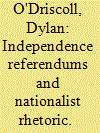

|
|
|
|
|
| Summary/Abstract |
Using the case study of the Kurdistan Region of Iraq (KRI) and the 2017 independence referendum, this article examines the nexus between independence referendums, nationalism and political power. It argues that the referendum in the KRI was held due to internal political competition and growing rebellion from the population against the poor economic performance and political situation rather than because the time was right for independence referendum. Focusing on the poor political and financial dynamics, as well as the lack of regional and international support for Kurdish independence, the article argues that independence was not a realistic goal and was rather used as a distraction amid internal turmoil. The example of the referendum in the KRI poses questions about the democratic credibility of such referenda, as the population were voting for an unachievable result and the referendum itself became a tool of internal political competition.
|
|
|
|
|
|
|
|
|
|
|
|
|
|
|
|
| 4 |
ID:
111578
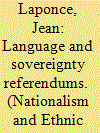

|
|
|
|
|
| Publication |
2012.
|
| Summary/Abstract |
The hypothesis that sovereignty referendums tend to bring closer together the boundaries of states and languages is tested on 80 referendums ranging from 1791 to 2011. The hypothesis is supported for union, transfer, as well as separation referendums though less clearly so in the latter case. The data show also that the boundary convergence is more significant if the zone-by-zone option, rather than the traditional majoritarian rules, is properly used.
|
|
|
|
|
|
|
|
|
|
|
|
|
|
|
|
| 5 |
ID:
174016


|
|
|
|
|
| Summary/Abstract |
Demands for a second Scottish independence referendum have persisted since 2014. The Scottish government introduced the Referendums (Scotland) Bill at Holyrood in May 2019 to enable referendums within the competence of the Scottish parliament. The Scottish National Party (SNP) government presented this as a framework enabling a range of referendums. Opponents saw this as legislating for a second independence referendum. The act will form a large part of the legal framework and rules for any second independence referendum. Importantly, the legislation provides innovation in electoral law more generally. This article discusses the background to the bill, its initial contents, and debates around and amendments to the bill. It discusses its electoral law innovations, before considering its limitations and place as constitutional debates play out over a second independence referendum.
|
|
|
|
|
|
|
|
|
|
|
|
|
|
|
|
| 6 |
ID:
122816
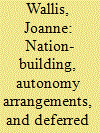

|
|
|
|
|
| Publication |
2013.
|
| Summary/Abstract |
After a protracted war of secession in 2001, the Bougainville region of Papua New Guinea was granted autonomy and deferred a referendum on its political future. This article argues that the Bougainville case highlights the challenges posed by attempts to settle self-determination disputes using these tools. It considers the challenges posed by deferred referendums, principally how to reconcile competing interpretations of the identity and future political status of the region. It also considers the challenges posed by attempts to negotiate the relationship between the unique identities of autonomous regions and their identities within the larger state.
|
|
|
|
|
|
|
|
|
|
|
|
|
|
|
|
| 7 |
ID:
116459
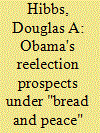

|
|
|
|
|
| Publication |
2012.
|
| Summary/Abstract |
According to the Bread and Peace Model postwar, American presidential elections should be interpreted as a sequence of referendums on the incumbent party's record during its four-year mandate period. In fact postwar aggregate votes for president are well explained by just two objectively measured fundamental determinants: (1) weighted-average growth of per capita real disposable personal income over the term, and (2) cumulative US military fatalities due to unprovoked, hostile deployments of American armed forces in foreign wars. No other outside variable systematically affects postwar aggregate votes for president.
|
|
|
|
|
|
|
|
|
|
|
|
|
|
|
|
| 8 |
ID:
111576
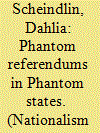

|
|
|
|
|
| Publication |
2012.
|
| Summary/Abstract |
This study examines the widespread use of referendums in entities that have declared statehood unilaterally but are not generally recognized or accepted as sovereign entities. Referendums in this situation pose a problem: to the voters, they are sufficiently a meaningful political process to warrant participation. Yet, to outsiders-including actors who may have large influence over whether the referendum's political goal can be implemented-the entire process may be meaningless. This article argues that the referendum process is not meaningless but symbolic: It fills the space between actual and desired political reality for the entities who vote. Drawing on referendum experiences in seven phantom states, the research shows that the referendums play a critical role in articulating political intentions, staking out a self-determination or sovereignty claim, displaying democratic legitimacy and forging international divisions and coalitions. Even not holding a referendum has a symbolic meaning regarding the political goals of an incomplete entity. I argue that not only can referendums signal these meanings but they can contribute to making political goals increasingly real.
|
|
|
|
|
|
|
|
|
|
|
|
|
|
|
|
| 9 |
ID:
178556


|
|
|
|
|
| Summary/Abstract |
International institutions are increasingly being challenged by domestic opposition and nationalist political forces. Yet, levels of politicization differ significantly across countries facing the same international authority as well as within countries over time. This raises the question of when and why the mass public poses a challenge to international cooperation. In this article, we develop a theoretical framework for understanding the nature and implications of politicization of international cooperation, outlining three scope conditions: the nature of public contestation, the activities of political entrepreneurs, and the permissiveness of political opportunity structures. By empirically examining these scope conditions, we demonstrate that politicization can have both stabilizing and destabilizing effects on international cooperation. Highlighting the systemic implications of politicization for international cooperation has important implications for international relations scholarship. Although international organizations may face challenges, they also have ways of being remarkably resilient.
|
|
|
|
|
|
|
|
|
|
|
|
|
|
|
|
| 10 |
ID:
176079


|
|
|
|
|
| Summary/Abstract |
Many researchers, journalists and politicians are inclined to connect populism and referendums. While in theory the two rest on similar principles, in practice this is not the case. This article shows that populist political elites make limited use of referendums compared both to their rhetoric and to non‐populists. Our findings indicate that the use of referendums is not a reflection of populist politics. They also illustrate how populists may initiate referendums strategically, and they win them quite often. The analysis draws on all sixty‐four national level referendums in Europe initiated by political elites between 2000 and 2019.
|
|
|
|
|
|
|
|
|
|
|
|
|
|
|
|
| 11 |
ID:
091504
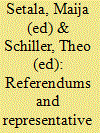

|
|
|
|
|
| Publication |
London, Routledge, 2009.
|
| Description |
xiii, 227p.
|
| Standard Number |
9780415481038
|
|
|
|
|
|
|
|
|
|
|
|
Copies: C:1/I:0,R:0,Q:0
Circulation
| Accession# | Call# | Current Location | Status | Policy | Location |
| 054515 | 328.23/SET 054515 | Main | On Shelf | General | |
|
|
|
|
| 12 |
ID:
144834
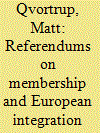

|
|
|
|
|
| Summary/Abstract |
There are many myths about referendums. The most common one is that voters are inherently sceptical and tend to vote no when given the opportunity. This article analyses some of the commonly held ‘truths’ about referendums on EU matters. Based on a statistical analysis of all forty-three EU-related referendums since 1972, it shows that governments tend to lose referendums if they have been in office for a long time, that emotive words on the ballot paper are correlated with a high yes vote and that a high turnout is correlated with a vote against European integration, but campaign spending is inconsequential. Based solely on statistical evidence from the previous forty-three referendums, the opponents of EU membership will win the Brexit referendum.
|
|
|
|
|
|
|
|
|
|
|
|
|
|
|
|
| 13 |
ID:
111572
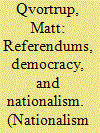

|
|
|
| 14 |
ID:
160354
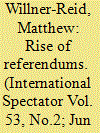

|
|
|
|
|
| Summary/Abstract |
Perhaps the most notable development of the second half of the twentieth century, and its greatest achievement, is the rapid global spread of two institutions: democracy and multilateralism. These institutions have collectively made us safer and more prosperous than any previous generation in history. But could the two now be coming into conflict? Recent experience regarding the EU suggests both that referendums as a tool of foreign policy decision-making are likely to become more common in the future, and that they pose major risks for multilateralism and international cooperation.
|
|
|
|
|
|
|
|
|
|
|
|
|
|
|
|
| 15 |
ID:
111661
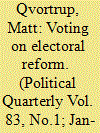

|
|
|
|
|
| Publication |
2012.
|
| Summary/Abstract |
Referendums on electoral systems are relatively rare. In most countries changes to the electoral system are enacted through the legislatures. The British referendum in May 2011 is thus one of the rare examples. In this article it is shown that the apparently idiosyncratic factors in the referendum were consistent with general trends identified in other referendums. While the media focused on the harshness of the campaign, the referendum also resulted in surprising coalitions between long-term foes, thus suggesting that the referendum contributed to cross-party cooperation rarely seen in a majoritarian system like that of Great Britain.
|
|
|
|
|
|
|
|
|
|
|
|
|
|
|
|
|
|
|
|
|